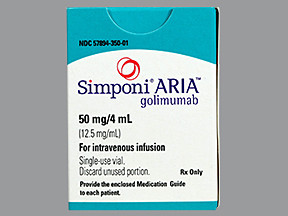GOLIMUMAB - INJECTION
PHONETIC PRONUNCIATION: (goe-LIM-ue-mab)
COMMON BRAND NAME(S): Simponi Aria
GENERIC NAME(S): golimumab
Uses
USES: This medication is used to treat certain types of arthritis (such as rheumatoid, psoriatic, ankylosing spondylitis). Golimumab belongs to a class of drugs known as TNF blockers. It works by blocking a protein (tumor necrosis factor - TNF) in your body's immune system that causes joint swelling and damage. Golimumab helps slow joint damage and reduce joint pain/swelling so you can move better.
How to use GOLIMUMAB - INJECTION
HOW TO USE: Read the Medication Guide provided by your pharmacist before you start using golimumab and each time you get a refill. If you have any questions, ask your doctor or pharmacist. This drug is given by slow injection into a vein by a health care professional, usually over 30 minutes. After the first dose, this medication is usually given again 4 weeks later, then every 8 weeks as directed by your doctor. The dosage is based on your weight. You should receive this medication regularly to get the most benefit from it. To help you remember, mark your calendar to keep track of when to receive the next dose. Tell your doctor if your symptoms do not improve or if they worsen.
Side Effects
Precautions
Interactions
Overdose
Images
Reviews
Faq for GOLIMUMAB - INJECTION
Golimumab injection is used to treat certain autoimmune diseases such as rheumatoid arthritis, psoriatic arthritis, ankylosing spondylitis, and ulcerative colitis.
Golimumab works by targeting and inhibiting a protein called tumor necrosis factor (TNF), which is involved in inflammation and autoimmune responses in the body.
Golimumab is administered as an injection under the skin (subcutaneously) or as an intravenous infusion, depending on the condition being treated.
Common side effects of golumimab injection may include injection site reactions, respiratory infections, nausea, headache, and stomach pain. Serious side effects may include serious infections, liver problems, and allergic reactions.
The dosing frequency of golimumab injection varies depending on the condition being treated. For rheumatoid arthritis and psoriatic arthritis, the usual dose is once every four weeks. For ankylosing spondylitis, the usual dose is once every four weeks or once every twelve weeks. For ulcerative colitis, the usual dose is once every four weeks.
Golimumab should be used during pregnancy only if clearly needed. It is not recommended for use during breastfeeding as it may pass into breast milk.
Moderate alcohol consumption is generally considered acceptable while taking golimumab. However, it is important to consult with your healthcare provider for personalized advice.
Golimumab may interact with certain medications, including live vaccines, other biologic drugs, and immunosuppressive medications. It is important to inform your healthcare provider about all the medications you are taking before starting golimumab.
The onset of response to golimumab can vary depending on the individual and the condition being treated. Some patients may start experiencing improvement in symptoms within a few weeks, while others may take several months.
Warning
WARNING: This medication can decrease your body's ability to fight an infection. This effect can lead to very serious (possibly fatal) infections (such as fungal infections, bacterial infections including tuberculosis). Tell your doctor your medical history, especially of past/recent/current infections. You should also tell your doctor if you have lived or traveled in areas where certain fungal infections (such as coccidioidomycosis, histoplasmosis) are common or if you have been near someone with tuberculosis. Areas where these types of fungal infections are commonly found include the Ohio and Mississippi River valleys and the southwestern United States. Your doctor will test you for tuberculosis (TB) infection before and during treatment with this drug. If you are diagnosed with TB, your doctor will first prescribe treatment for this to prevent a serious TB infection while using golimumab. Though it is very unlikely to happen, there is a risk (especially in children/teens/young adults) of developing cancer (such as lymphoma, skin cancer) due to this medication or due to your medical condition. Discuss the risks and benefits of treatment with your doctor. Tell your doctor right away if you develop symptoms such as unusual lumps/growths, swollen glands, unexplained weight loss, persistent fever, or night sweats.
Disclaimer
IMPORTANT: HOW TO USE THIS INFORMATION: This is a summary and does NOT have all possible information about this product. This information does not assure that this product is safe, effective, or appropriate for you. This information is not individual medical advice and does not substitute for the advice of your health care professional. Always ask your health care professional for complete information about this product and your specific health needs.

No Reviews Yet